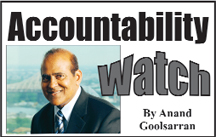So far, we have discussed the four topics relating to the above subject, the first being the prorogation of Parliament. The President had agreed that the National Assembly would resume its sittings on 10 November 2014 after it went into recess on 10 August 2014. He, however, changed his mind within hours of the convening of the Assembly and prorogued Parliament.
Earlier in the week, the President added his voice to the Administration’s criticism of the British High Commissioner’s remarks on the prorogation of Parliament and the failure to hold local government for 17 years. He accused the High Commissioner of double standards by remaining silent on the two incidents of prorogation of the Canadian Parliament. Unlike in Guyana, however, the Canadian Constitution provides for the Governor General, a politically neutral official and representative of the Queen, to prorogue the Legislature on the advice of the Prime Minister, usually when the agenda set out in Governor General’s speech is completed. In other cases, there must be adequate justification, and the Governor General may set conditions, including the length of time involved.
In both incidents to which the President referred, the Governor General insisted on a finite period for the prorogation. In December 2008, the Legislature was prorogued for 53 days to stave off a vote of no confidence in Stephen Harper’s minority government. However, it was not before the Prime Minister gave the assurance that within two to three weeks after Christmas break, his


